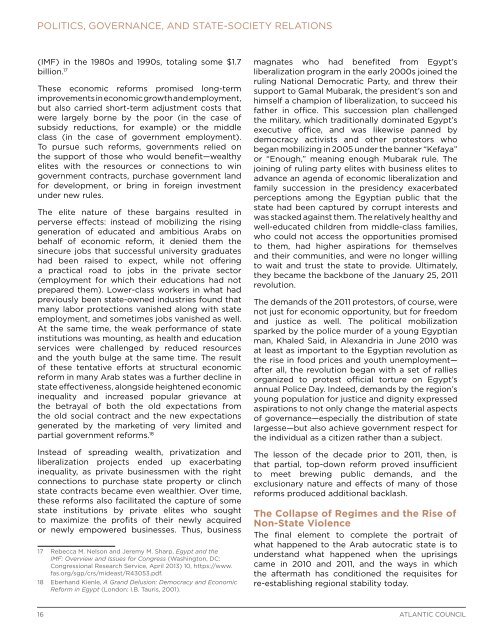POLITICS GOVERNANCE STATE-SOCIETY RELATIONS
Politics_Governance_and_State-Society_Relations_web_1121
Politics_Governance_and_State-Society_Relations_web_1121
Create successful ePaper yourself
Turn your PDF publications into a flip-book with our unique Google optimized e-Paper software.
<strong>POLITICS</strong>, <strong>GOVERNANCE</strong>, AND <strong>STATE</strong>-<strong>SOCIETY</strong> <strong>RELATIONS</strong><br />
(IMF) in the 1980s and 1990s, totaling some $1.7<br />
billion. 17<br />
These economic reforms promised long-term<br />
improvements in economic growth and employment,<br />
but also carried short-term adjustment costs that<br />
were largely borne by the poor (in the case of<br />
subsidy reductions, for example) or the middle<br />
class (in the case of government employment).<br />
To pursue such reforms, governments relied on<br />
the support of those who would benefit—wealthy<br />
elites with the resources or connections to win<br />
government contracts, purchase government land<br />
for development, or bring in foreign investment<br />
under new rules.<br />
The elite nature of these bargains resulted in<br />
perverse effects: instead of mobilizing the rising<br />
generation of educated and ambitious Arabs on<br />
behalf of economic reform, it denied them the<br />
sinecure jobs that successful university graduates<br />
had been raised to expect, while not offering<br />
a practical road to jobs in the private sector<br />
(employment for which their educations had not<br />
prepared them). Lower-class workers in what had<br />
previously been state-owned industries found that<br />
many labor protections vanished along with state<br />
employment, and sometimes jobs vanished as well.<br />
At the same time, the weak performance of state<br />
institutions was mounting, as health and education<br />
services were challenged by reduced resources<br />
and the youth bulge at the same time. The result<br />
of these tentative efforts at structural economic<br />
reform in many Arab states was a further decline in<br />
state effectiveness, alongside heightened economic<br />
inequality and increased popular grievance at<br />
the betrayal of both the old expectations from<br />
the old social contract and the new expectations<br />
generated by the marketing of very limited and<br />
partial government reforms. 18<br />
Instead of spreading wealth, privatization and<br />
liberalization projects ended up exacerbating<br />
inequality, as private businessmen with the right<br />
connections to purchase state property or clinch<br />
state contracts became even wealthier. Over time,<br />
these reforms also facilitated the capture of some<br />
state institutions by private elites who sought<br />
to maximize the profits of their newly acquired<br />
or newly empowered businesses. Thus, business<br />
17 Rebecca M. Nelson and Jeremy M. Sharp, Egypt and the<br />
IMF: Overview and Issues for Congress (Washington, DC:<br />
Congressional Research Service, April 2013) 10, https://www.<br />
fas.org/sgp/crs/mideast/R43053.pdf.<br />
18 Eberhand Kienle, A Grand Delusion: Democracy and Economic<br />
Reform in Egypt (London: I.B. Tauris, 2001).<br />
magnates who had benefited from Egypt’s<br />
liberalization program in the early 2000s joined the<br />
ruling National Democratic Party, and threw their<br />
support to Gamal Mubarak, the president’s son and<br />
himself a champion of liberalization, to succeed his<br />
father in office. This succession plan challenged<br />
the military, which traditionally dominated Egypt’s<br />
executive office, and was likewise panned by<br />
democracy activists and other protestors who<br />
began mobilizing in 2005 under the banner “Kefaya”<br />
or “Enough,” meaning enough Mubarak rule. The<br />
joining of ruling party elites with business elites to<br />
advance an agenda of economic liberalization and<br />
family succession in the presidency exacerbated<br />
perceptions among the Egyptian public that the<br />
state had been captured by corrupt interests and<br />
was stacked against them. The relatively healthy and<br />
well-educated children from middle-class families,<br />
who could not access the opportunities promised<br />
to them, had higher aspirations for themselves<br />
and their communities, and were no longer willing<br />
to wait and trust the state to provide. Ultimately,<br />
they became the backbone of the January 25, 2011<br />
revolution.<br />
The demands of the 2011 protestors, of course, were<br />
not just for economic opportunity, but for freedom<br />
and justice as well. The political mobilization<br />
sparked by the police murder of a young Egyptian<br />
man, Khaled Said, in Alexandria in June 2010 was<br />
at least as important to the Egyptian revolution as<br />
the rise in food prices and youth unemployment—<br />
after all, the revolution began with a set of rallies<br />
organized to protest official torture on Egypt’s<br />
annual Police Day. Indeed, demands by the region’s<br />
young population for justice and dignity expressed<br />
aspirations to not only change the material aspects<br />
of governance—especially the distribution of state<br />
largesse—but also achieve government respect for<br />
the individual as a citizen rather than a subject.<br />
The lesson of the decade prior to 2011, then, is<br />
that partial, top-down reform proved insufficient<br />
to meet brewing public demands, and the<br />
exclusionary nature and effects of many of those<br />
reforms produced additional backlash.<br />
The Collapse of Regimes and the Rise of<br />
Non-State Violence<br />
The final element to complete the portrait of<br />
what happened to the Arab autocratic state is to<br />
understand what happened when the uprisings<br />
came in 2010 and 2011, and the ways in which<br />
the aftermath has conditioned the requisites for<br />
re-establishing regional stability today.<br />
16 ATLANTIC COUNCIL



